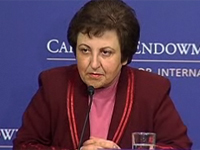Registration
You will receive an email confirming your registration.
Nobel Peace Prize winner Shirin Ebadi stressed that a single international standard of human rights should apply to all nations and called for dialogue between Iranian and American citizens even if the Obama administration’s anticipated overture to Iran fails. “There is no difference that cannot be resolved,” Ebadi said, through frank dialogue between the presidents, legislatures, and people of Iran and the United States.
Noting that the 1979 Islamic Revolution was approved by a majority of Iranians thirty years ago, Ebadi emphasized that a plurality of votes does not automatically legitimate a government’s mandate. Rather, it is a government’s respect for, and adherence to, the understanding of human rights agreed upon by the international community that confers legitimacy.
Carnegie associate Karim Sadjadpour and Daniel Brumberg of the United States Institute of Peace moderated the discussion of human rights and civil society in Iran.
Key points:
Human Rights
- Ebadi rejected the idea of an Islamic standard of human rights. Allowing multiple interpretations of human rights weakens the overall concept, to the detriment of society’s poorest and least-represented members.
- The idea that human rights and Islam are mutually exclusive is promoted by non-democratic leaders to perpetuate their own rule.
U.S. Engagement with Iran
- Despite the hostile rhetoric of President Mahmoud Ahmadinejad and other regime hardliners, there is real desire for better relations with the United States in Iran. Ebadi highlighted in particular the case of students and Iranian expatriates who have difficulty traveling between the two countries.
- Easing restrictions on student visas is one concrete step the United States could take to foster civil society exchanges.
- Harsh economic sanctions hurt the Iranian people without impacting the regime, Ebadi argued, and threatening military action strengthens the government’s position.
Iranian Civil Society
- As Internet access expands, social networking sites are becoming an important platform for Iranian civil society activists. Ebadi described a “race” between government censors and Iranian youth, who have become adept at circumventing government filters to gain access to blocked sites.
- Political issues that complicate presidential-level engagement should not interfere with civil society dialogue.
